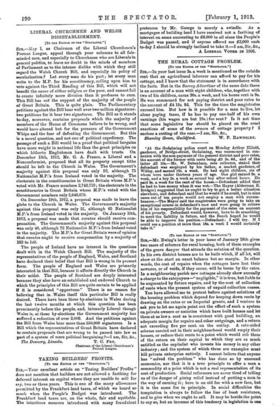LIBERAL CHURCHMEN AND WELSH DISESTABLISHMENT.
[TO THE EDITOR OP THE "SPECTATOR"] SIR,—May I, as Chairman of the Liberal Churchmen's Protest League, appeal through your columns to all fair- minded men, and especially to Churchmen who are Liberals in general politics, to leave no doubt in the minds of members of Parliament as to the intense dislike with which they still regard the Welsh Church Bill, and especially its policy of secularization ? Let every man do his part ; let every man write to the M.P. for his constituency, calling upon him to vote against the Third Reading of this Bill, which will not benefit the cause of either religion or the poor, and cannot fail to create infinitely more division than it professes to cure. This Bill has not the support of the majority of the people of Great Britain. This is quite plain. The Parliamentary petitions against the Bill bear well over two million signatures: two petitions for it bear two signatures. The Bill as it stands to-day, moreover, contains proposals which the majority of members of the House of Commons believe to be wrong, and would have altered but for the pressure of the Government Whips and the fear of defeating the Government. But this is a moral question, and not one of political expediency. The passage of such a Bill would be a proof that political bargains have more weight in national life than the great principles on which hitherto Englishmen have dealt with trusts. On December 13th, 1912, Mr. G. A. France, a Liberal and a Nonconformist, proposed that all its property except tithe should be left to the Church in Wales. The Government's majority against this proposal was only 50, although 75 Nationalist M.P.'s from Ireland voted in the majority. The electorate in the constituencies in Great Britain whose M.P.'s voted with Mr. France numbers 2,743,718; the electorate in the constituencies in Great Britain whose M.P.'s voted with the Government numbers only 2,648,079.
On December 19th, 1912, a proposal was made to leave the glebe to the Church in Wales. The Government's majority against this proposal was only 55, although 65 Nationalist M.P.'s from Ireland voted in the majority. On January 10th, 1913, a proposal was made that curates should receive com- pensation. The Government's majority against this proposal was only 40, although 72 Nationalist M.P.'s from Ireland voted in the majority. The M.P.'s for Great Britain were of opinion that curates ought to receive compensation by a majority of 183 to 160.
The people of Ireland have no interest in the questions dealt with in the Welsh Church Bill. The majority of the representatives of the people of England, Wales, and Scotland have declared their belief that that Bill is wrong in its present form. The people of England and Wales are primarily interested in that Bill, because it affects directly the Church in their midst. The people of Scotland are deeply interested because they also have an established and endowed Church to which the principles of this Bill are quite certain to be applied if it is considered "opportune." There is no reason for believing that in .Wales itself this particular Bill is really desired. There have been three by-elections in Wales during the last twelve months at which this question has been prominently before the people, and, intensely Liberal though Wales is, at these by-elections the Government majority has suffered a reduction of over 2,000. And the petitions against the Bill from Wales bear more than 550,000 signatures. Is a Bill which the representatives of Great Britain have declared to contain proposals that are wrong to be passed into law as part of a system of mere political bargaining ?—I am, Sir, &c.,
Chairman of the Liberal Churchmen's Protest League.










































 Previous page
Previous page